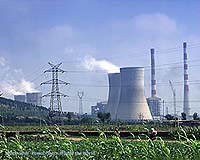
Sun Jul 22, 2007 6:41AM EDT
BEIJING (Reuters) - Tibet is warming up faster than anywhere else in the world, Xinhua news agency said on Sunday.
The average annual temperature in Tibet, the roof of the world, was rising at a speed of 0.3 degrees Celsius every 10 years, Xinhua said.
Chinese scientists have long warned that rising temperatures on the Qinghai-Tibet plateau will melt glaciers, dry up major Chinese rivers and trigger more droughts, sandstorms and desertification.
The Tibet Meteorological Bureau said the temperature rise was most obvious in the west of the region. Tibet, with its glaciers and high altitude, has been regarded as sensitive to the effects of global warming.
Currently, China's average temperature is rising at 0.4 degree Celsius every 100 years, while a report by the Intergovernmental Panel on Climate Change showed the average surface temperature of the globe had risen 0.74 degree Celsius in the past 100 years, Xinhua said.
China is rapidly overtaking the United States to become the world's top emitter of greenhouse gases. It is under rising international pressure to accept mandatory caps on carbon dioxide emissions from its factories and vehicles.
China has refused to comply, but the government has shown greater efforts in addressing energy and environment issues.
 SAN FRANCISCO -- United Nations Secretary-General Ban Ki-moon urged the United States to take the lead in combating global warming during a visit to California to learn about the state's campaign to curb its greenhouse gas emissions.
SAN FRANCISCO -- United Nations Secretary-General Ban Ki-moon urged the United States to take the lead in combating global warming during a visit to California to learn about the state's campaign to curb its greenhouse gas emissions.











